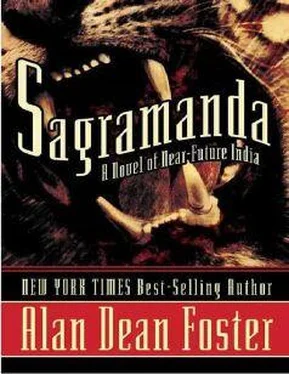Alan Foster - Sagramanda, a Novel of Near-Future India
Здесь есть возможность читать онлайн «Alan Foster - Sagramanda, a Novel of Near-Future India» весь текст электронной книги совершенно бесплатно (целиком полную версию без сокращений). В некоторых случаях можно слушать аудио, скачать через торрент в формате fb2 и присутствует краткое содержание. Жанр: Фантастика и фэнтези, на английском языке. Описание произведения, (предисловие) а так же отзывы посетителей доступны на портале библиотеки ЛибКат.
- Название:Sagramanda, a Novel of Near-Future India
- Автор:
- Жанр:
- Год:неизвестен
- ISBN:нет данных
- Рейтинг книги:5 / 5. Голосов: 1
-
Избранное:Добавить в избранное
- Отзывы:
-
Ваша оценка:
- 100
- 1
- 2
- 3
- 4
- 5
Sagramanda, a Novel of Near-Future India: краткое содержание, описание и аннотация
Предлагаем к чтению аннотацию, описание, краткое содержание или предисловие (зависит от того, что написал сам автор книги «Sagramanda, a Novel of Near-Future India»). Если вы не нашли необходимую информацию о книге — напишите в комментариях, мы постараемся отыскать её.
Sagramanda, a Novel of Near-Future India — читать онлайн бесплатно полную книгу (весь текст) целиком
Ниже представлен текст книги, разбитый по страницам. Система сохранения места последней прочитанной страницы, позволяет с удобством читать онлайн бесплатно книгу «Sagramanda, a Novel of Near-Future India», без необходимости каждый раз заново искать на чём Вы остановились. Поставьте закладку, и сможете в любой момент перейти на страницу, на которой закончили чтение.
Интервал:
Закладка:
She lived in Sagramanda.
The tiger had come out of the Sundarbans. That was certain. Under cover of night, it had worked its way into the southeastern suburbs of the city. This was not as difficult to do as a visitor from elsewhere might imagine. Sagramanda was full of parks and residential green-belts; a necessary if permanently insufficient counterweight to the burgeoning pressure of its swollen and always growing population. Eternally in need of land, the expanding megalopolis had long ago pushed and shoved its way up against the immense delta complex where the Ganges and the Brahmaputra merged to form the world's largest remaining mangrove swamp. The ever-shifting waterways on the western side of the border with Bangladesh constituted the Indian portion of the Sundarbans Preserve. Traveling only at night, it was possible for large animals to migrate, to work their way into the outskirts of the metropolis itself. Monkeys did so with ease. The chital and sambar deer that populated many of the city's green areas moved freely between parks and the delta of the Sundarbans.
But not usually a tiger.
Three meters long and twelve years old, the big male weighed more than a quarter of a ton. Among the trees and paved pathways and benches and fountains he drifted silently, a striped wraith invisible beneath the wan illumination of a splinter of moon. He was strong and experienced-but he had also lived a long time. He was old enough to hope for easier prey than the skittish sambar and the swift chital. Also, he had not fed in some time, and was very hungry.
The wildlife division of the municipal authority was as aware of animal movements as were the monkeys and mongooses. Steps had been taken long ago. Though in a city of a hundred million other demands took budgetary precedence over wildlife considerations, some few millions of rupees still trickled down for observation and reaction.
The tiger's approach to the outermost city limits did not go unnoticed. Its heat signature was detected by one of the dozens of auto mated monitoring stations located on the border between inhabited suburb and unpopulated Sundarbans. Identified as a Panthera tigris tigris large enough to present a potential danger should it continue on its present path, the station automatically activated the two intercep tors nearest the big cat.
Quarter ton or not, the tiger moved in utter silence, advancing with less noise than the wind. On a nearly moonless night it was all but invisible. Movement directly ahead made it pause.
Two figures stood staring into the woodland, trying to penetrate a night that was dark as smoke. Both held rifles. Their eyes scanned the tree line intently, unblinkingly. Another person might have found the lack of any eye-blinks unnerving, but they were characteristic of the interceptors. The big cat's nostrils flared; the tips of his whiskers rose. The night air was suffused with the distinctive scent of human. He hesitated.
Ordinarily, a tiger confronted with a pair of armed human shapes would have turned and retreated. Ordinarily, the scent alone would have been enough to send it loping swiftly back the way it had come. But the tigers of the Sundarbans were and always had been particularly bold. The emptiness in the male's belly was profound. It charged.
Both figures turned immediately to confront it. Rifle muzzles rose, and the sound of gunfire split the night. Flying through the air, two hundred and forty kilos of wide-eyed, gaping-mouthed cat struck the nearer of the two interceptors.
And passed completely through it.
Surprised, the tiger hit the ground, dug in powerful claws, and whirled. Both interceptors had turned to face it. The echo of large-cal iber weapons had grown repetitive. Puzzled but not frightened, the tiger attacked again. This time a massive paw swiped directly through the middle of the other interceptor. Its gun muzzle dropped until it passed right through the tiger's head and neck.
The interceptors were virtuals. Like their images, the strong stink of human was projected from a small, tracked vehicle the size of a lawnmower. The autonomous vehicles could go where no human watchman could go, stay on duty twenty-four hours a day, never grew tired, did not need bathroom or meal breaks, and did not go on strike over the lack of a comprehensive health plan.
Reaching down with a paw, the inquisitive tiger batted hard at the nearest of the motorized devices. The projection of an armed human hunter was skewed sideways, then flickered out entirely as the vehicle was knocked completely over on its side. Half the lights within the device went dark. Meanwhile, the second vehicle had turned toward the tiger, aiming its virtual in the cat's direction. Nose in the air, the tiger turned away and, ignoring the repeated recorded sounds of a heavy weapon being fired, resumed pacing along its original path.
The children should not have been out that late. There were six of them, evenly divided between boys and girls, all friends, all giggling and laughing at their special adventure. They had the playground area on the edge of the housing development all to themselves. It was an upscale complex, benefiting from its proximity to the wildlife pre serve, offering its fortunate residents views toward Bangladesh of trees and water and birds instead of the seething urban stew that was the city interior.
One of the girls tripped one of the boys as he was heading for the gel-coated spiral slide. Uttering a mildly shocking grown-up word, he rose, brushed sand off his pants, and began to chase her. The other boys urged him on while the remaining girls encouraged their darting, weaving companion in her flight. She was a good soccer player and at first avoided his pursuit easily, leaving him frustrated and half angry, half exhilarated. But he was a little faster. Closing on her, he reached for the long, flying, fashionably blue-and-green streaked black hair that trailed behind his teaser.
An enormous dark mass erupted out of a clump of bushes just to their left. It struck silently: no growls, no intimidating roars designed to stop prey in its tracks with blood-chilling sonics. That kind of hunting the tiger left to its cousin the lion. It did not even have to bite. The force of the charge and the weight behind it snapped the girl's neck on impact.
The boy who had nearly caught her stumbled and went down onto his knees, then his face, wrapping both hands protectively over his head as he pushed his face into the sandy soil. Behind him his friends were screaming, girls and boys alike. He did not, could not, look up, so he did not see the tiger carrying the girl off, her neck in its mouth. Bobbing loosely, her head hung straight down, the tips of her carefully streaked hair just brushing the ground. She had died instantly, on impact, so fast it was mercifully doubtful she had even known what had happened.
One of the other boys finally summoned up enough courage to run forward and check on his friend. He was able to comfort him some what, but he could do nothing to still the shaking that was convulsing the other boy's body. Behind them, the surviving girls could not stop screaming.
Farther back, across from the playground, a few lights were starting to wink to life within the nearest apartment building. Anxious adults who were not virtuals were hurrying toward the children. They were not armed, and there was nothing they could do.
Living close to Nature sometimes brought with it things that were not benefits.
The killing would be reported, but it was unlikely anything would be done. Hunting tigers took time and money the city did not have. Furthermore, the status accorded to large predators was inviolate. Cold as it seemed on paper, there were far more children in India than tigers. The incident in the night was an isolated one. It would soon, however, prove itself to be that rare exception to the rule.
Читать дальшеИнтервал:
Закладка:
Похожие книги на «Sagramanda, a Novel of Near-Future India»
Представляем Вашему вниманию похожие книги на «Sagramanda, a Novel of Near-Future India» списком для выбора. Мы отобрали схожую по названию и смыслу литературу в надежде предоставить читателям больше вариантов отыскать новые, интересные, ещё непрочитанные произведения.
Обсуждение, отзывы о книге «Sagramanda, a Novel of Near-Future India» и просто собственные мнения читателей. Оставьте ваши комментарии, напишите, что Вы думаете о произведении, его смысле или главных героях. Укажите что конкретно понравилось, а что нет, и почему Вы так считаете.










